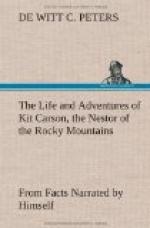from the pocket of his hunting-shirt a slung shot
that weighed nearly four ounces, which he always carried
to dispatch his game with when it was in the last
agonies of death. With uplifted hand, the Indian
hesitated; for, he knew the character of the man who
stood before him, as they had hunted together during
many moons gone by, on the same mountains and on the
same trail. At last, using his own savage dialect,
in order that his words could not be understood by
others about him, the savage answered the Mexican
hunter by saying, “that by chance they might
some day meet again;” a threat which fell harmless
at the feet of Sanchez. As he took his departure,
the chief added, in Spanish, “I will tell these
things to my father,[20] Kit Carson,” as if further
attempting to intimidate the hunter; but Sanchez knew
that his own and Carson’s opinions were the
same in regard to this man; therefore, he smiled at
the rascal’s knavery.
Chico Velasques
was followed in his chieftainship by
Blanco,
who did his utmost to walk in the footsteps of his
illustrious predecessor; but, he was not so cunning,
and was less successful in his encounters with the
Americans and Mexicans, and therefore had not that
influence with his tribe which the former possessed.
Still, he performed his quantum of mischief, and yet
lives to play his part in the great drama of Indian
life. An Apache Indian is rather small in stature,
but everything about him denotes symmetry and strength.
His limbs are almost straight, and their muscles are
as hard as iron. The elasticity of his movements,
when in the least excited, shows a high degree of
physical training. His coal-black eye exhibits
an amount of treachery rarely seen elsewhere, proving
the truth of the Chinese adage, that “the tongue
may deceive, but the eye can never play the rogue.”
[Footnote 20: This expression of “father,”
with these Indians, means their agent.]
But to return to the narrative. The commanding
officer of the party sent out against these Indians,
on arriving again at Taos, reported to Col. Beall
that the reason he had returned was because, at the
present time, it was impracticable to cross the mountains.
That brave and experienced officer replied, “that
there was no such word as impracticable in the soldier’s
vocabulary, and that nothing ought to be impossible
for the 1st regiment of United States dragoons to
accomplish.” Suiting his actions to his
words, Col. Beall reorganized the command, took
charge of it himself, and employed Kit Carson as his
guide. When everything was in proper trim, this
expedition set out, and after surmounting many obstacles
and privations, finally accomplished the feat of crossing
the snow-clad mountains, and after a long and fruitless
search for the Indians, the men were obliged to turn
about, because their stock of provisions was running
low. As the command emerged through the “Sangre
de Christo Pass,” on their return route,
they came suddenly into view of a village of Apaches.




